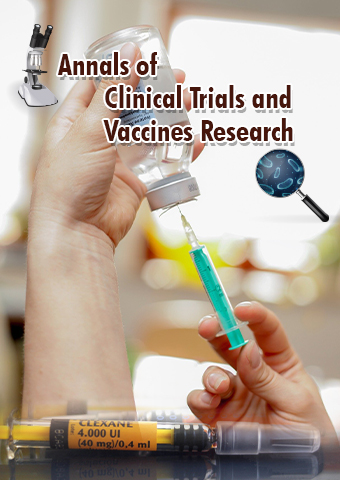Perspective - Annals of Clinical Trials and Vaccines Research (2024) Volume 14, Issue 2
Navigating the Crucial Phase 2 Clinical Trials: Unveiling the Journey towards Medical Breakthroughs
- Corresponding Author:
- Jamel Nerrosiee
Department of Pharmacology,
University of Menahemia,
Menahemia,
Israel
E-mail: Jamel@nerrosgmail.com
Received: 26-Mar-2024, Manuscript No. ACTVR-24-130529; Editor assigned: 29-Mar-2024, Pre QC No. ACTVR-24-130529 (PQ); Reviewed: 12-Apr-2024, QC No. ACTVR-24-130529; Revised: 23-Apr-2024, Manuscript No. ACTVR-24-130529 (R); Published: 30-Apr-2024, DOI: 10.37532/ ACTVR.2024.14(2).224-225
Introduction
Phase 2 clinical trials represent a pivotal stage in the journey of a medical intervention from laboratory bench to patient bedside. These trials serve as a crucial bridge between the initial safety assessments conducted in phase 1 trials and the large-scale efficacy evaluations carried out in phase 3. Within the realm of medical research, phase 2 trials stand as a pivotal gatekeeper, determining whether a promising therapy advances further or fades away. In this comprehensive exploration, we delve into the intricate landscape of phase 2 clinical trials, unraveling their significance, intricacies, and impact on the advancement of medical science.
Description
Understanding phase 2 clinical trials
Phase 2 clinical trials are meticulously designed studies aimed at assessing the efficacy and safety of a medical intervention in a larger cohort of patients. Unlike phase 1 trials, which primarily focus on safety and dosage determination in a small group of healthy volunteers, phase 2 trials involve individuals afflicted with the targeted disease or condition. These trials aim to gather crucial data regarding the intervention's effectiveness, optimal dosage levels, potential side effects, and overall therapeutic profile.
The scope and objectives of phase 2 trials
The scope of phase 2 trials varies depending on the nature of the medical intervention under investigation. Whether it involves a novel drug candidate, a therapeutic vaccine, or a medical device, phase 2 trials are designed to address specific research questions while adhering to ethical and regulatory standards. Some of the primary objectives of phase 2 trials include:
Efficacy assessment: Phase 2 trials aim to evaluate the intervention's efficacy in treating the targeted disease or condition. This assessment typically involves comparing the intervention's effects against a placebo or standard treatment, if available.
Dose optimization: Determining the optimal dosage or dosing regimen is crucial for maximizing efficacy while minimizing adverse effects. Phase 2 trials often involve testing different dose levels to identify the most effective and tolerable option.
Safety profile: While safety assessments begin in phase 1, phase 2 trials provide an opportunity to gather additional safety data in a larger patient population. Monitoring adverse reactions and assessing the intervention's overall safety profile is a critical component of phase 2 studies.
Design and implementation of phase 2 trials
The design and implementation of phase 2 trials require careful planning and execution to ensure scientific validity and ethical integrity. Key considerations in designing phase 2 trials include:
Patient selection: Phase 2 trials enroll patients who meet specific inclusion criteria based on factors such as disease severity, previous treatments, and demographic characteristics. Inclusion criteria are established to ensure homogeneity within the study population and minimize confounding variables.
Sample size determination: The sample size of a phase 2 trial is determined based on statistical considerations to achieve adequate power for detecting clinically meaningful differences between treatment groups. While phase 2 trials typically involve smaller sample sizes than phase 3 trials, they must still be sufficiently powered to yield reliable results.
Challenges and considerations in phase 2 trials
Despite their significance in the drug development process, phase 2 trials are not without challenges and considerations. Some of the key challenges encountered in phase 2 trials include:
Heterogeneity of patient population: Patients enrolled in phase 2 trials may exhibit significant heterogeneity in terms of disease characteristics, treatment history, and underlying comorbidities. This heterogeneity can pose challenges in interpreting study results and generalizing findings to broader patient populations.
Ethical considerations: Balancing the potential benefits of experimental interventions with the ethical imperative to protect participants' welfare is paramount in phase 2 trials. Ethical considerations include informed consent, riskbenefit assessment, and equitable access to investigational therapies.
Resource limitations: Conducting phase 2 trials requires substantial resources in terms of funding, infrastructure, and expertise. Limited resources may constrain the scope and scale of phase 2 studies, necessitating efficient allocation and utilization of available resources.
The impact of phase 2 trials on medical innovation
Phase 2 clinical trials play a pivotal role in driving medical innovation and advancing patient care. By providing crucial insights into the efficacy, safety, and optimal dosing of investigational interventions, phase 2 trials serve as a cornerstone of evidence-based medicine. The successful completion of phase 2 trials can pave the way for further development and eventual regulatory approval of promising therapies, ultimately translating scientific discoveries into tangible clinical benefits for patients.
Conclusion
Phase 2 clinical trials occupy a central position in the translational research continuum, serving as a critical juncture where scientific hypotheses are tested, and therapeutic potentials are realized. With their emphasis on efficacy assessment, dose optimization, and safety profiling, phase 2 trials represent a crucial step towards the eventual introduction of new treatments into clinical practice. As researchers continue to navigate the complex landscape of phase 2 trials, their unwavering dedication and commitment to scientific rigor hold the promise of unlocking breakthroughs that transform the landscape of modern medicine.

